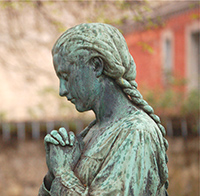 .
I just re-read a beautiful piece by Adrianne Murchison examining whether there is a difference between prayer and meditation. She questions whether there is a difference because she learned to meditate through prayer. Saying the rosary transformed into silent meditation and the experience of Oneness for her. Here is how she describes her experience:
.
I just re-read a beautiful piece by Adrianne Murchison examining whether there is a difference between prayer and meditation. She questions whether there is a difference because she learned to meditate through prayer. Saying the rosary transformed into silent meditation and the experience of Oneness for her. Here is how she describes her experience:
.
"I’m Catholic and first learned to meditate years ago by saying the Rosary –a recitation of the “Hail Mary" prayer. I start by whispering the words. After a few minutes I am no longer whispering but, instead, mouthing the words in silence. Soon the words and my thoughts become laboring, because I am with God and they are not necessary. I let my words and thoughts go and simply experience Oneness."
What I've been exploring is at which point did the prayer become meditation? Is prayer the part where she is saying the words, since prayer is usually associated with speech and communication? Does it become meditation at the point when she lets go of the words and thoughts? Is meditation arriving at the point where she feels "with God" and no longer needs words? But then, isn't that how some people would define meditation, as a means of getting close to God or becoming one with God? Is it the transition from words to Oneness that defines it as meditation? Perhaps it becomes meditation because the experience of Oneness happens and there is no possibility of prayer in Oneness. If prayer is communication between self and "other", how could there be prayer when self and other have merged into one?
What struck me about her experience is that, although it occurred in the context of prayer and her religious and spiritual practice, it contains elements common to many meditative practices whose goal is to transcend thought and reach a deeper level of the mind where all is one. Many practices provide an object of attention as a means of allowing the mind to relax its focus, expand and move beyond duality to the experience of Oneness. It can happen with the repetition of a mantra, staring at a candle flame or even watching the breath. Letting go of thought is an essential element of this experience, as meaning keeps the mind engaged in distinctions like self and other, past and future, and in Oneness these distinctions dissolve.
The experience of Oneness can also happen spontaneously without prayer or meditation or any other practice. We love to do things that help that to happen -- like sitting and watching the fire in the fireplace, looking at the ocean waves come in and go out, and listening to music that takes us out of our heads and into our hearts.
I'd love to know what you think. Perhaps you meditate but don't pray. Or you might pray but not meditate. Maybe you do both, and maybe you do neither. But chances are you've had the feeling of being at one with everything at some point in your life. Have you experienced Oneness and, if so, do you know how it came about? What is prayer? What is meditation? What, if anything, makes them different?
Related posts:
Do you have to be spiritual to meditate? Is prayer meditation? Where prayer and meditation meet



